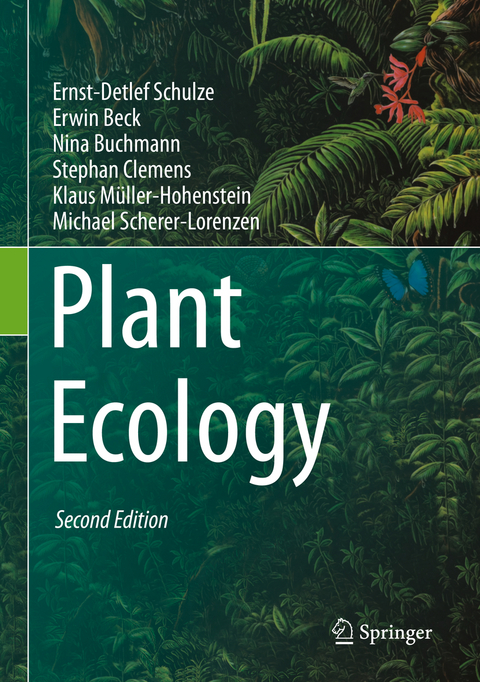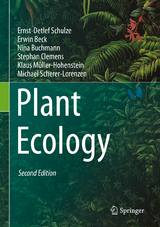Plant Ecology
Springer Berlin (Verlag)
978-3-662-56231-4 (ISBN)
This completely updated and revised second edition provides a unique and up-to-date treatment of all aspects of plant ecology, making it an ideal textbook and reference work for students, researchers and practitioners.
More than 500 high-quality images and drawings, mostly in colour, aid readers' understanding of various key topics, while the clear structure and straightforward style make it user friendly and particularly useful for students. Written by leading experts, it offers authoritative information, including relevant references.
While Plant Ecology primarily addresses graduate students in biology and ecology, it is also a valuable resource for post-graduate students and researchers in botany, environmental sciences and landscape ecology, as well as all those whose study or work touches on agriculture, forestry, land use, and landscape management.
Key Topics:
- Molecular ecophysiology (molecular stress physiology: light, temperature, oxygen deficiency, water deficit (drought), unfavorable soil mineral conditions, biotic stress)
- Physiological and biophysical plant ecology (ecophysiology of plants: thermal balance, water, nutrient, carbon relations)
- Ecosystem ecology (characteristics of ecosystems, approaches how to study and how to model terrestrial ecosystems, biogeochemical fluxes in terrestrial ecosystems)
- Community ecology and biological diversity (development of plant communities in time and space, interactions between plants and plant communities with the abiotic and the biotic environment, biodiversity and ecosystem functioning)
- Global ecology (global biogeochemical cycles, Dynamic Global Vegetation Models, global change and terrestrial ecosystems)
Ernst-Detlef Schulze Max Planck Institute for Biogeochemistry Jena, Germany dschulze@bgc-jena.mpg.de Erwin Beck University of Bayreuth Department of Plant Physiology Bayreuth, Germany erwin.beck@uni-bayreuth.de Nina Buchmann ETH Zurich Institute of Agricultural Science Zurich, Switzerland nina.buchmann@usys.ethz.ch Stephan Clemens University of Bayreuth Department of Plant Physiology Bayreuth, Germany stephan.clemens@uni-bayreuth.de
Introduction.- General Themes of Molecular Stress Physiology.- Light.- Temperature.- Oxygen Deficiency.- Water Deficiency (Drought).- Adverse Soil Mineral Availability.- Biotic Stress.- Thermal Balance of Plants and Plant Communities.- Water Relations.- Nutrient Relations.- Carbon Relations.- Ecosystem Characteristics.- Approaches to Study Terrestrial Ecosystems.- Approaches to Model Processes at the Ecosystem Level.- Biogeochemical Fluxes in Terrestrial Ecosystems.- Development of Plant Communities in Time.- Spatial Distribution of Plants and Plant Communities.- Interactions between Plants, Plant Communities and the Abiotic and Biotic Environment.- Biodiversity.- Global Biogeochemical Cycles.- Dynamic Global Vegetation Models.- Global Change and Terrestrial Ecosystems.
| Erscheinungsdatum | 16.12.2019 |
|---|---|
| Co-Autor | Almut Arneth, Sönke Zähle, Carlos Sierra, Martin Schäfer, Carsten Dormann |
| Zusatzinfo | XXI, 926 p. 580 illus., 527 illus. in color. |
| Verlagsort | Berlin |
| Sprache | englisch |
| Maße | 178 x 254 mm |
| Gewicht | 1954 g |
| Themenwelt | Naturwissenschaften ► Biologie ► Botanik |
| Naturwissenschaften ► Biologie ► Ökologie / Naturschutz | |
| Schlagworte | biodiversity • biological diversity • Biophysical ecology • climate change • community ecology • ecosystem ecology • Global Ecology • molecular ecology • physiological ecology • Whole plant ecology |
| ISBN-10 | 3-662-56231-6 / 3662562316 |
| ISBN-13 | 978-3-662-56231-4 / 9783662562314 |
| Zustand | Neuware |
| Informationen gemäß Produktsicherheitsverordnung (GPSR) | |
| Haben Sie eine Frage zum Produkt? |
aus dem Bereich




